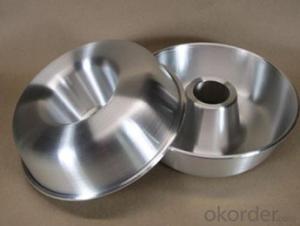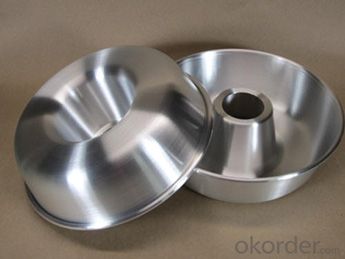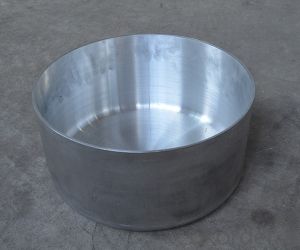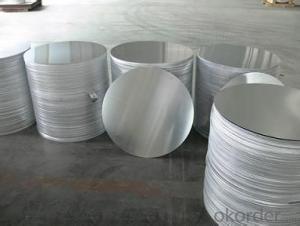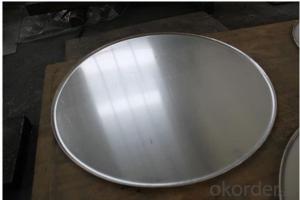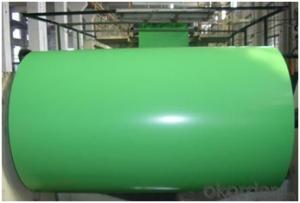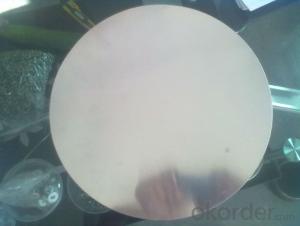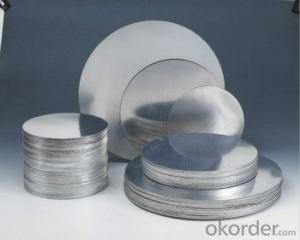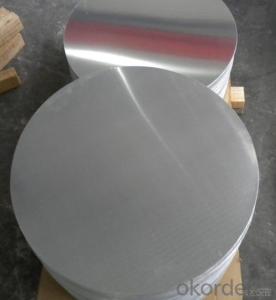1100 0 Aluminum Coil for Directly Casting Aluminium Circle Cookware Material
- Loading Port:
- Shanghai
- Payment Terms:
- TT OR LC
- Min Order Qty:
- 5 m.t.
- Supply Capability:
- 80000 m.t./month
OKorder Service Pledge
OKorder Financial Service
You Might Also Like
Specification
Directly Casting Aluminium Circle For Cookware Material
Description
Thickess | 0.55MM-8.0MM,As your request |
alloy | Aluminum circle Alloy 1050,1060,1100,3003 |
Temper |
H12.H14,H16,H18,H24,H26.O |
Diameter |
80mm-1200mm |
Dimensions | can be produced according to your specifications |
Advantage | Though smelting, casting, hot-rolling, cold-rolling, heat-treatment, finishing and other technology, the heavy melting alminium and an appropriate quality of alloying elements is processed to light nonferrous metal material which has the characters of fine luster, good looing, light weight, poisonless and smellessncss, and it also has good propertles of transmitting electric current and heat, processing and corrosion-resisting Applicability |
Application | The product is widely used in cold-extrusion, Reflector, Traffic sign or deeply-drawing for making electric rice cookers, non-stick pans/pots, kitchens, cookware, cooking-utensil |
Packing detail | Export standard package, bundled or be required. The inner size of container is below: 20ft GP: 5.8m(length) x 2.13m(width) x 2.18m(high) about 24-26CBM 40ft GP: 11.8m(length) x 2.13m(width) x 2.18m(high) about 54CBM 40ft HG: 11.8m(length) x 2.13m(width) x 2.72m(high) about 68CBM |

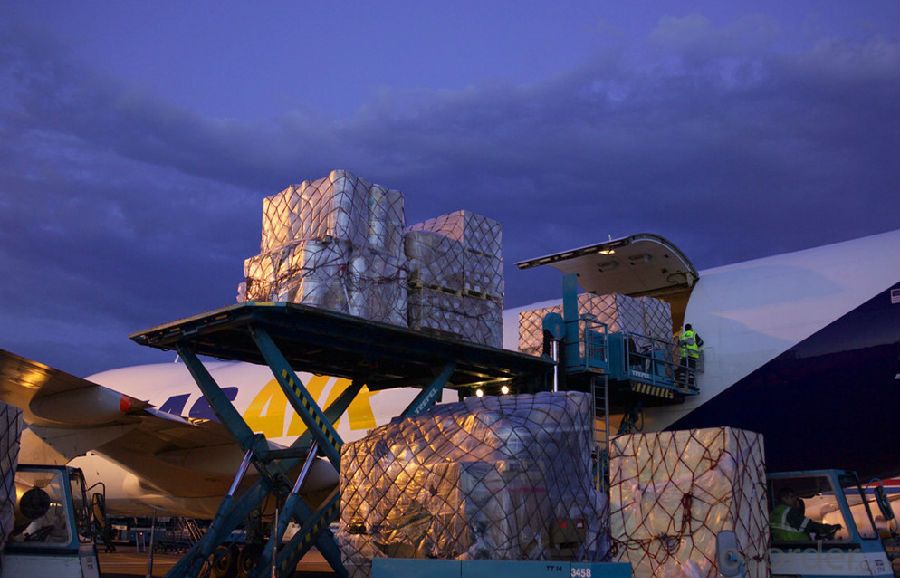
PVDF and PE Coated Aluminium Coils/Sheets
PVDF color pre coated aluminum coils/ sheets:
It is well known that fluorocarbon lacquer coating (PVDF coating) owes the best acid resistant/alkali and temperature tolerant capabilities of all painting materials. Being the best quality of precoated aluminum, PVDF coated coils are especially suitable for outdoor roofing walls and ceiling manufacturing.
Polyester (PE) color pre coated aluminum coils/ sheets :
Using high-grade polyester lacquer coating material, the finished coated coils are with delicate color uniform texture, color and diverse. It is the most popular and most common used materials in decorative usage. The PE coated aluminum are widely used in ACP( aluminum composite panel ) production and indoor ceiling usage.
FAQ
--Q: Do you provide free samples?
--A: Yes, free samples will be sent to you on freight at destination.
--Q: Can I get your latest products catalogue?
--A: Yes, it will be sent to you in no time.
--Q: What is the MOQ?
--A: 2 tons
--Q: What are your payment terms?
--A: We accept L/C, T/T.
--Q: What kinds of alloy can you supply?
--A: 1000 series: 1050, 1060, 1070, 1100, 1145, 1200
3000 series: 3003, 3004, 3105, 3104
5000 series: 5052, 5083, 5754, 5182
6000 series: 6061, 6063, 6062, 6063
8000 series: 8011, 8021
--Q: What kinds of temper can you supply?
--A: O-H112: O,H12,H14,H16,H18,H22,H24,H26,H,32,H34,H111,H112
T3, T4, T6
- Q: What is the electrical conductivity of aluminum coils?
- The electrical conductivity of aluminum coils is relatively high. Aluminum is known for its good conductivity, with a conductivity rating of approximately 37.7 x 10^6 siemens per meter (S/m). This makes aluminum an excellent choice for various electrical applications, including the manufacturing of coils. The high conductivity of aluminum allows for efficient transmission of electric current through the coils, making them suitable for use in electrical wiring, transformers, motors, and other electrical equipment.
- Q: Can aluminum coils be used for decorative purposes?
- Yes, aluminum coils can be used for decorative purposes. Aluminum is a versatile material that can be easily shaped and manipulated, making it suitable for a wide range of decorative applications. Aluminum coils are often used to create decorative trim, accents, and borders in various industries such as architecture, interior design, and automotive design. They can be painted or coated with different finishes to enhance their visual appeal and match the desired aesthetic. Due to their lightweight nature and durability, aluminum coils are also commonly used for decorative purposes in outdoor settings, such as garden ornaments, sculptures, and signage. Overall, aluminum coils offer a cost-effective and aesthetically pleasing option for incorporating decorative elements into various projects.
- Q: What is the typical width tolerance for aluminum coils?
- The typical width tolerance for aluminum coils can vary depending on the specific requirements and industry standards. However, a commonly accepted width tolerance for aluminum coils is typically ±0.005 to ±0.020 inches.
- Q: Can aluminum coils be used in automotive heat exchangers?
- Yes, aluminum coils can be used in automotive heat exchangers. Aluminum is a popular choice for heat exchangers due to its excellent heat transfer properties, lightweight nature, and corrosion resistance. It is widely used in automotive radiators and air conditioning systems to efficiently transfer heat and cool the engine or cabin.
- Q: How are aluminum coils stored to prevent damage?
- Aluminum coils are typically stored in a clean, dry, and well-ventilated area to prevent damage. They are often stacked horizontally or vertically on pallets or racks to ensure stability and avoid bending or deformation. Additionally, protective coverings or packaging materials such as plastic wraps or cardboard boxes may be used to shield the coils from moisture, dust, and other potential sources of damage.
- Q: Can aluminum coils be used in architectural applications?
- Aluminum coils, indeed, find application in architectural projects. The construction industry frequently employs aluminum due to its adaptability, endurance, and ease of manipulation. Architects often make use of aluminum coils for roofing, cladding, and facades, thanks to their malleability in creating diverse forms and proportions. Furthermore, these coils can be coated with various finishes to improve their visual appeal and safeguard against weathering and discoloration. Ultimately, given their blend of utility, attractiveness, and durability, aluminum coils have become a favored option for architectural purposes.
- Q: What are the common surface finishes for aluminum coils in the automotive industry?
- The common surface finishes for aluminum coils in the automotive industry include mill finish, painted finish, anodized finish, and laminated finish.
- Q: Can aluminum coils be formed into different shapes?
- Yes, aluminum coils can be formed into different shapes through various processes such as bending, rolling, or stamping.
- Q: How do aluminum coils contribute to the electrical conductivity of products?
- Aluminum coils contribute to the electrical conductivity of products due to their excellent electrical conductivity property. When electrical current is passed through aluminum coils, they allow the flow of electrons with minimal resistance, enabling efficient transmission of electricity and enhancing the overall conductivity of the product.
- Q: How are aluminum coils processed for specific surface coatings?
- Aluminum coils are processed for specific surface coatings through a series of steps that involve cleaning, pre-treatment, application of the coating, and curing. Firstly, the aluminum coils are thoroughly cleaned to remove any dirt, grease, or other contaminants that may hinder the adhesion of the coating. This is usually done through a combination of chemical cleaning agents, rinsing, and sometimes mechanical methods. After cleaning, the coils undergo a pre-treatment process. This step prepares the surface of the aluminum for optimal adhesion of the coating. Depending on the specific coating requirements, the pre-treatment can involve chemical etching, conversion coating, or both. Chemical etching creates a rough surface that enhances the bond between the aluminum and the coating, while conversion coating forms a thin layer that improves corrosion resistance and adhesion. Once the pre-treatment is complete, the specific surface coating is applied onto the aluminum coils. This can be done through various methods such as coil coating, spray coating, or electrostatic coating. Coil coating is a common technique where the coil is continuously fed through a coating line where the coating material is applied evenly and precisely onto the surface. After the coating is applied, the aluminum coils are cured to ensure the coating properly adheres and hardens. Curing can be done through heat, where the coated coils are passed through an oven or furnace at a specific temperature and time to promote cross-linking and curing of the coating material. Alternatively, some coatings may require UV curing, where the coated coils are exposed to ultraviolet light to achieve the desired curing process. Overall, the process of processing aluminum coils for specific surface coatings involves cleaning, pre-treatment, coating application, and curing. This ensures that the coils are properly prepared and coated to meet the desired surface properties and performance requirements.
Send your message to us
1100 0 Aluminum Coil for Directly Casting Aluminium Circle Cookware Material
- Loading Port:
- Shanghai
- Payment Terms:
- TT OR LC
- Min Order Qty:
- 5 m.t.
- Supply Capability:
- 80000 m.t./month
OKorder Service Pledge
OKorder Financial Service
Similar products
Hot products
Hot Searches
Related keywords
